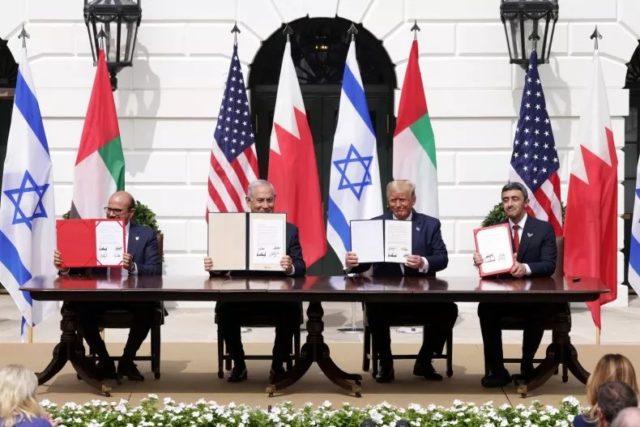Journalist Drew Holden kept a list of politicians and mainstream media outlets that have been denigrating, downplaying and outright mocking President Donald Trump’s approach to the Middle East. From Samantha Power to John Kerry to Senators Bernie Sanders and Chuck Schumer to Rep. Mark Pocan; from Reuters to CNN to The New Yorker to Foreign Policy to the Guardian to…well, you get the point.
Mostly, it is a litany of how much more dangerous the region has become for a variety of Trump’s moves, and how the U.S. is doomed to failure. Following the Israel-United Arab Emirates and Israel-Bahrain peace agreements, witnessed by the United States, criticism has largely been centered around the idea that it really isn’t a big deal. They’re little countries. They don’t matter. They would have done it without Trump. The U.S. doesn’t need the oil, so who cares?
Wait. Wait. What was that about oil?
Who doesn’t need oil?
It is true that with President Trump’s support of fracking, the U.S. no longer relies on the import of oil from the Persian Gulf. But our allies—in particular, our Asian allies—do. And China certainly does.
And herein lies the almost entirely unremarked upon the importance of regional peace, freedom of navigation, the United States and the connection between Middle East policy and China policy—a connection that appears to have escaped left-leaning punditry.
The Shiite Islamic Republic of Iran has been threatening oil shipping from the Persian Gulf by the other oil-producing states, which are predominantly Sunni. The United States Navy guarantees freedom of navigation in the Gulf, and we have bases in Oman, Qatar (odd, but true), Kuwait, the UAE, Saudi Arabia and Bahrain with which to do it. There are those in the U.S. who say, “We don’t import Persian Gulf oil, so why should we pay for the security that allows the Arabs to profit?” “Why do we provide security for ships going to China?” China, which is in the process of building a much bigger navy and has established a Middle Eastern base in Djibouti on the Red Sea near the U.S. base there, could conceivably take over that responsibility.
Do we want them to do so? No.
Global Commons are generally identified as those parts of the planet that fall outside national jurisdictions and to which all nations have access. The high seas—beyond territorial waters—are part of the Commons, but historically, they have to be protected. The British Navy did it. The U.S. Navy does it. Sometimes there is a partnership, as in the case of defending ships against the Somali pirates. Do we really think the Chinese Navy will be a responsible stakeholder, ensuring freedom of the seas for the import of goods contracted by its adversaries?
China has just spent a decade claiming territoriality along the extensive chains of Pacific islands off its mainland. They have built and armed new land masses. And despite the 2016 Hague ruling against certain of China’s claims, and the effects of COVID-19, the buildup continues. The countries along the chain—Japan, South Korea, Taiwan, the Philippines, Indonesia, Malaysia, and Vietnam—strongly object, but have been cowed by Beijing. Every single one of them—yes, including Vietnam—is a country friendly to the United States.
Oil from the Persian Gulf passes through the Indian Ocean to the Pacific to those countries. China is establishing a potential base at the port of Gwadar, Pakistan, along the route. If China controls the island chain, it could halt ships passing through. Controlling the passage of oil in the Persian Gulf itself simply provides China with more ability to control oil at the origin for itself and its friends—and keep it away from its adversaries, our friends.
Yes, it is expensive and no, we don’t have a legal obligation to the Global Commons. But the concept of Chinese control of Middle Eastern waterways, Pacific coastal islands (natural or man-made, armed or not), plus China’s Belt and Road Initiative from western China through Central Asia to Iran, should make Americans decidedly unhappy.
The appropriate response is to reinforce relations with our allies and friendly countries in eastern Asia, the Indian subcontinent, central Asia, and the Middle East.
The U.S. Navy, after having to quarantine the aircraft carrier USS Theodore Roosevelt for coronavirus cases, has returned in force to the Indo-Pacific with three aircraft carriers accompanied by Navy cruisers, destroyers, fighter jets, and other aircraft. It is the military part of America’s new understanding of China’s handling of the virus, the crackdown on Hong Kong, as well as the militarization of the islands—and its spying on American security and research institutions.
Peace is always good; peace is always important. But in the larger sense, solidification of the pro-western Sunni Arab camp—the Persian Gulf states plus Egypt and Jordan, and then others who choose to join—with Israel is a great geopolitical achievement for the United States and President Trump.


